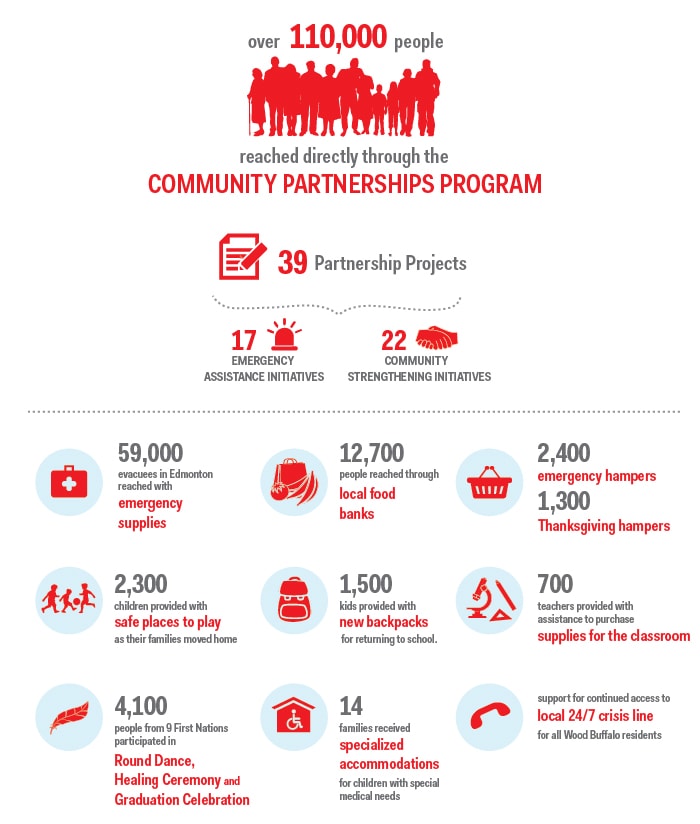By Jenn McManus, Vice President, Alberta and Northwest Territories
The signs of hope, strength and recovery are everywhere now when I visit Fort McMurray and the surrounding region in northern Alberta.
It’s been slightly more than nine months since wildfires wiped out so much for so many there, and when I talk with people in Wood Buffalo, I still hear their struggles. But increasingly, I also hear more optimism. This positive trend is worth noting because sometimes people who have never experienced a disaster don’t realize the initial days, weeks and even months after a destructive event are just the start of a long, painful recovery.
When people talk about disasters, many just focus on the earliest terrifying moments – images of families fleeing the wildfires, or people wading through chest-high water from flooded homes in High River, or more recently, folks huddling without heat in the New Brunswick ice storms.
This is an important fact as we are increasingly asked why the Canadian Red Cross doesn’t spend donations faster and why funds are still available years after a major disaster.
Picking up the pieces of a disrupted life, destroyed home or ruined community can take years. And we believe in providing help as long as it’s needed.
In fact, almost four years after severe flooding destroyed properties across southern Alberta, and a tragic train accident devastated Lac-Mégantic in Québec, people and communities in these places are still in need of support. There is not a time limit on rebuilding lives.
Dan Stuckless, general manager of McMurray Métis, which supports its indigenous population in the area, says “even nine months after the event, I know it’s going to be a long road... Some people are recovering quicker and some are still left behind.”
He knows several trappers who live off the land but lost everything – trap lines, equipment, and cabins – until individual financial support from the Red Cross helped them begin to re-establish their way of life.
Recently, researchers from MacEwan University in Edmonton studied the Alberta wildfires and observed: “The full impact of disasters isn’t something you can see right away.” They estimate the disaster in Wood Buffalo will cost $8.86 billion, including direct and indirect costs like mental health and environmental losses. They warn these costs will continue to change for a decade.
We recognize this and we don’t tell people or communities how their recovery should unfold. We follow their lead and find collaborative solutions together.
Red Cross is still working side by side with people in the Wood Buffalo region on a Community Partnerships Table to assess and give out $50 million in community grants. To date, 39 grants totalling $10.3 million have been invested in community groups. The partnership table will continue to collaborate on community funding until it’s no longer needed. When will that be? When the community decides.
Talking with other organizations receiving support, we hear similar concerns.
Borealis Counselling Services, which worked in the region before the wildfires, also recognizes that “recovery is a long-term process,” executive director Cathy Underhill told us recently. “I know from the floods (in 2013), there are still people being supported in southern Alberta.”
Janet Giles, a YMCA vice president overseeing Fort McMurray’s Westwood facility, agrees that recovery should not have a time limit or rules.
“We don’t see recovery as a short-term thing,” Giles says. “We are seeing the needs of the community and people are going to be much longer term. It will take a while for us to recover, but we will and we will be stronger than before.”
And in the end, this is our goal, too. Our dedicated Red Cross teams will keep working with people and communities to help them build back better and stronger. And together, we will stand by their side for as long it takes.
See
videos featuring some of the community organizations that have received support from Red Cross.
